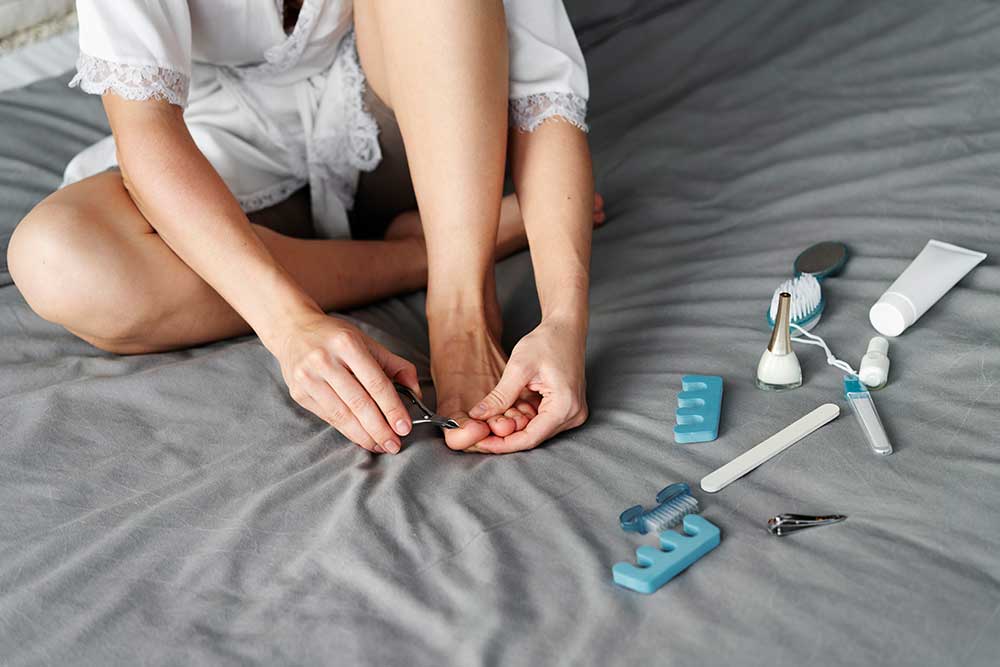Understanding the Connection Between Diabetes and Foot Health
Diabetes is a chronic condition that affects multiple areas of the body, including the feet. High blood sugar levels can lead to nerve damage (neuropathy), reduced circulation, and a higher risk of infections, making foot care an essential part of diabetes management. Without proper diabetes foot care, minor foot issues can quickly escalate into serious complications, including ulcers and even amputation.
For individuals with diabetes, understanding the risks and implementing preventive measures is crucial for maintaining foot health and overall well-being.
How Diabetes Affects Foot Health
Nerve Damage (Diabetic Neuropathy)
Diabetic neuropathy occurs when prolonged high blood sugar damages the nerves, particularly in the feet and legs. This can lead to:
- Loss of sensation – making it harder to detect cuts, blisters, or sores.
- Pain or tingling – some individuals may experience burning, sharp pain, or numbness.
- Muscle weakness – affecting balance and mobility.
Without feeling pain or discomfort, people with neuropathy may not notice minor injuries, allowing them to worsen over time.
Poor Circulation and Delayed Healing
Diabetes can cause blood vessels to narrow, reducing circulation to the feet. Poor circulation slows wound healing and increases the risk of infections. Signs of circulation issues include:
- Cold feet
- Slow-healing cuts or sores
- Discoloration in the toes or feet
Without proper diabetes foot care, poor circulation can lead to severe complications, such as non-healing ulcers.
Increased Risk of Foot Infections
Even small cuts, blisters, or ingrown toenails can become infected more easily in individuals with diabetes. Common infections include:
- Fungal infections – such as athlete’s foot and toenail fungus.
- Bacterial infections – causing redness, swelling, and warmth.
- Ulcers – open wounds that may not heal properly, leading to severe complications.
If untreated, infections can spread and lead to serious medical issues, including the need for amputation.
Foot Deformities and Charcot Foot
People with diabetes are also at risk for structural changes in their feet, including:
- Hammertoes – a deformity that causes toes to curl downward.
- Bunions – bony bumps that develop on the joints of the big toe.
- Charcot Foot – a condition where weakened bones in the foot break and collapse, leading to significant deformity.
These conditions can cause pain, difficulty walking, and an increased risk of foot ulcers.
Essential Diabetes Foot Care Tips
Proper foot care can prevent complications and help maintain overall health. Here is how to protect your feet:
Inspect Your Feet Daily
Check your feet every day for any signs of cuts, blisters, swelling, or redness. Use a mirror to view hard-to-see areas or ask a family member for help.
Wash and Moisturize Your Feet
- Wash your feet daily with lukewarm water and mild soap.
- Dry them thoroughly, especially between the toes.
- Apply a moisturizer to prevent dry, cracked skin (avoid applying between toes to prevent fungal growth).
Wear Proper Footwear
- Choose shoes that fit well and provide good support.
- Avoid walking barefoot to reduce the risk of injury.
- Wear clean, dry socks, preferably moisture-wicking diabetic socks.
Trim Toenails Properly
- Cut nails straight across to prevent ingrown toenails.
- Avoid cutting too short or rounding the edges.
- If you have trouble trimming your nails, consider visiting a podiatrist.
Manage Blood Sugar Levels
- Keep blood sugar levels within the target range set by your doctor.
- A balanced diet, regular exercise, and medication adherence help prevent diabetic complications.
Maintain Proper Foot Hygiene
- Change socks daily and wear breathable, moisture-wicking materials.
- Avoid using heating pads or soaking feet in hot water, as neuropathy may reduce sensitivity to temperature.
- Gently massage your feet to promote circulation.

Schedule Regular Foot Exams
Seeing a podiatrist regularly can help detect issues early. A foot specialist can check for signs of neuropathy, circulation problems, or foot deformities and recommend proper treatment.
Warning Signs That Require Immediate Medical Attention
If you notice any of the following symptoms, contact a podiatrist or healthcare provider immediately:
- A wound that won’t heal
- Redness, swelling, or warmth in the feet
- Persistent pain or numbness
- Discoloration in the toes
- Signs of infection (pus, odor, or spreading redness)
Ignoring these warning signs can lead to severe complications, so early intervention is key.
FAQs About Diabetes Foot Care
Why is foot care important for people with diabetes?
Diabetes increases the risk of nerve damage and circulation issues, making it harder for wounds to heal. Proper foot care helps prevent infections, ulcers, and potential amputations.
How often should I check my feet?
It is recommended to inspect your feet daily to catch any issues early before they develop into serious complications.
Can I treat foot infections at home?
Minor infections may be treated with antiseptics, but it is best to see a podiatrist for proper care. Never ignore an infected wound if you have diabetes.
What kind of shoes should I wear?
Diabetic-friendly shoes with good arch support, cushioning, and a wide toe box help prevent foot injuries. Avoid tight, narrow, or high-heeled shoes.
When should I see a podiatrist?
You should visit a podiatrist at least once a year for a foot exam or immediately if you notice wounds, infections, or changes in sensation.
Protect Your Feet with Expert Care
Managing diabetes requires a proactive approach to foot health. By following proper diabetes foot care practices, you can reduce the risk of serious complications and maintain mobility and comfort.
At Central Arkansas Foot and Ankle Specialists, we specialize in diabetic foot care, providing expert guidance and treatment to help prevent serious foot problems. Located in Conway, Arkansas, our full-service podiatry clinic offers comprehensive foot exams, wound care, and personalized treatment plans for diabetic patients.
Call (501) 483-0900 today to schedule an appointment and take control of your foot health!

